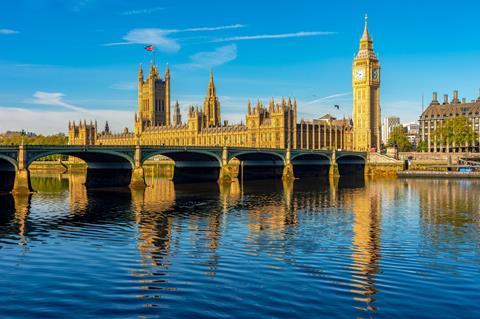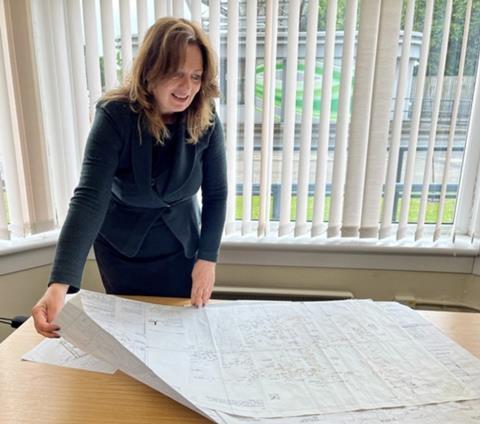With a fresh cohort of MPs who bring architectural and planning expertise to Parliament, Ben Flatman asks whether this new perspective can help address the UK’s long-standing issues with urban design and housing policy, or if they will be stymied by the realities of political life

In the hallowed halls of Westminster, where decisions shaping the nation are made, the voices of those with in-depth experience of the built environment have historically been few and far between. While the British parliament has been well-stocked with lawyers, teachers, ex-military personnel, trade unionists and career politicians, architects and built environment specialists have been glaringly underrepresented.
Some believe that this imbalance has had significant implications for how the UK approaches planning, design, building safety and the broader issues of housing and infrastructure.

Architects with political careers tend to be the exception rather than the rule. A rare example is Richard Rogers who, although not an MP, was a Labour life peer and influential in advising on urban planning policies during the New Labour era.
His is a rare case, and the absence of architects in Westminster has contributed to a political landscape that often lacks nuanced understanding and oversight of the built environment.
There are several reasons why architects and built environment specialists may have steered clear of politics. The architectural profession often demands a deep, long-term engagement with projects, leaving little time or energy for the rigours of political life.
Additionally, the adversarial nature of politics may not appeal to professionals whose work is often collaborative and focused on creating consensus. This disconnect might explain why architects have not been drawn to Westminster in significant numbers.
However, the limited knowledge within our political class about the built environment has arguably contributed to a broader misunderstanding of the importance of high-quality design and sustainable urban development.
The Grenfell Tower fire in 2017 starkly highlighted the consequences of this gap in expertise. Poor parliamentary oversight, inadequate regulation and a lack of understanding of building safety standards played a crucial role in the disaster, which led to the loss of 72 lives.
Were the ministers who were pushing a deregulatory agenda in the early 2010s aware of the implications for building safety?
If there was ever a time for architects, planners and other professionals connected with the built environment to step into the fray of local and national politics, that time is now
Former MP Emma Dent Coad
The often poor quality of architecture in the UK – from substandard public housing to failing town centres – can arguably be traced back to a political system that has often treated the built environment as an afterthought. With few advocates for high-quality design in positions of power, aesthetics, placemaking and sustainability in the built environment are often neglected.

In June 2017, Emma Dent Coad, an architectural historian and respected local councillor, won the constituency of Kensington for Labour at the general election by just 20 votes. Rogers described it as a “wonderful win” and applauded Dent Coad’s campaign focus on housing and equality through the planning system, saying housing needed a “radical shakeup” and should be viewed as a social service.
Just days later, on 14 June, the Grenfell fire occured within her constituency, overshadowing and thereafter occupying much of her time in parliament. As a councillor in Kensington and Chelsea, she has been and remains a vocal advocate for the victims and for regulatory reform.
But her stint at Westminster was to be short lived, as she lost her seat in the 2019 “get Brexit done” election. She observed of her time in the Commons that, while she found other MPs interested in fire safety – including former firefighters – few government ministers seemed to care.
In 2022 she wrote in BD: “We are witnessing utter chaos in government. If there was ever a time for architects, planners and other professionals connected with the built environment – those with a commitment to social justice – to step into the fray of local and national politics, that time is now.”
>> Also read: Rogers hails architectural historian’s ‘wonderful’ election victory
>> Also read: Politics needs specialists from the built environment – and it needs you now!
The built environment shapes our daily lives, our communities and our future. The government is now seeking to push through major planning reform as part of its housebuilding agenda. But without well-informed built environment expertise in parliament, does the UK risk continuing down a path where poor design and inadequate oversight lead to further tragedies, as well as missed opportunities for creating vibrant, sustainable urban spaces?
Addressing this gap is not just about improving the quality of buildings; it is about ensuring that the places we live, work and gather in are safe, healthy and conducive to a high quality of life.
But there are signs that things could be changing at Westminster. This year’s general election saw a clutch of new MPs elected who have a background in architecture and related fields.
The new MPs with experience to build on
Sarah Gibson - Liberal Democrat MP for Chippenham

Before entering Parliament, the newly elected Liberal Democrat MP for Chippenham had a long-standing career in architecture, coupled with an involvement in local politics. She is now the Lib Dem spokesperson on business.
Gibson studied architecture at Kingston University and the Bartlett. Her professional journey includes co-founding LABOX, a multidisciplinary architectural design practice, with a presence in the UK and Spain. LABOX has tackled a range of projects from urban planning to large-scale public buildings.
Gibson’s political career began at a local level, when she was elected to Wiltshire council in 2017, representing Bradford-on-Avon South. She was re-elected in 2021 and also served as the mayor of Bradford-on-Avon in 2021.
Her tenure on the council was marked by her active opposition to controversial local developments, such as the proposed £200m Westbury incinerator.
In addition to her political and professional work, Gibson has contributed to academia, working as a part-time tutor at the University of Bath’s engineering and architecture department. Her dual expertise in architecture and public service potentially positions her as a significant advocate for built environment issues in Westminster.
Gideon Amos - Liberal Democrat MP for Taunton and Wellington
Following a career in architecture, planning and urban design, Gideon Amos OBE secured the seat of Taunton and Wellington in the 2024 general election with a significant majority. He brings a wealth of expertise in sustainable development and infrastructure planning to his role in parliament and is the Lib Dem spokesperson on housing and planning.
Amos grew up in Somerset and studied architecture at Oxford Polytechnic (now Oxford Brookes University). He began his career designing and managing housing and listed-building projects in the private sector before moving into influential roles within the planning and development sector.

He was appointed as a development designer at Atkins in 1994 and later became a director at Planning Aid for London in 1997. He then served as chief executive of the Town and Country Planning Association (TCPA) from 2000 to 2010, where he initiated EU projects on development and climate change.
Amos served on advisory groups focused on planning and eco-development at what was then the Department for Communities and Local Government. His contributions to sustainable development earned him an OBE in 2009.
In addition to his work at the TCPA, Amos co-founded Amos Ellis Consulting (AEC) in 2015. The firm specialises in delivering integrated solutions in planning, architecture and sustainable development and has worked on a range of projects, from major infrastructure to smaller eco-developments.
Amos’s political career includes serving on Oxford City Council from 1992 to 1996, where he served on the planning committee. His extensive experience in architecture and planning positions him as a powerful advocate for sustainable development in Parliament, where he could help to influence policies that promote more well-designed, resilient communities.
Alison Taylor - Labour MP for Paisley and Renfrewshire North
With over 30 years of experience as a chartered surveyor, the newly elected MP for Paisley and Renfrewshire North brings a background in land economics and business management to her role in Westminster.
She has identified the UK’s “transition to a greener future” and “de-carbonisation” as two of her key priorities.

Taylor studied land economics in Paisley and is a chartered surveyor and member of RICS. Her professional career began in 1992 at Alan Watt Consulting, a Glasgow-based chartered surveying practice. She quickly rose through the ranks, becoming managing director in 2004.
Following the acquisition of the firm by GVA Grimley in 2007, Taylor continued to excel, eventually becoming a senior director. When GVA merged with Avison Young in 2019, she was appointed principal and managing director of the Glasgow office, while also serving a three-year term on the UK executive committee.
In her final year before entering parliament, Taylor worked as a senior consultant at Avison Young, leveraging her extensive experience in transactions and advisory services. Her business acumen and deep understanding of the property market are seen as significant assets as she transitions into her political career.
Taylor says she is committed to bringing stability and economic growth to the UK, drawing on her professional background to advocate for job creation and investment in public services.
Quoted in the Renfrewshire Gazette, she said in her election-night speech that: “The main thing Labour is going to bring is an end to the chaos.
“It’s going to bring stability and, from that, I’ve got a business background, so I think it’ll bring about economic growth. That’s what we need.
“We need economic growth, not only to create new jobs, but we need it to grow the economy, to get more money coming in for our public services so we can invest in them.”
Mike Reader - Labour MP for Northampton South

Mike Reader brings extensive experience in the built environment sector to his new role as MP for Northampton South. A civil engineering graduate, Reader’s career spans over a decade in the construction industry, starting with Pick Everard, where he helped establish Perfect Circle, a joint venture with Gleeds and Aecom, creating 500 jobs in the East Midlands.
In 2017, Reader joined Mace, where he played a pivotal role during the COVID-19 pandemic as operations director for an NHS Nightingale project.
Reader’s political ambitions were ignited during his time at Pick Everard under the Conservative-led coalition government. His built environment expertise and commitment to public sector investment underpin his political vision, as seen in his maiden speech in the Commons, where he emphasised: “I come to this place as an advocate for the built environment… my journey into the world of politics has been shaped by my time in industry.
“I first saw the impact of austerity on my public sector clients, with school programmes cancelled, infrastructure investment stalled and hospitals left crying out for funding. That drove me to join the Labour party and find my political voice…”
The recent election of MPs with backgrounds in architecture, surveying and urban design has the potential to begin to change the culture at Westminster. Their combined expertise could help to address long-standing issues from housing quality to sustainable urban development.
For Alison Taylor, being in the governing party obviously helps, but Sarah Gibson and Gideon Amos – the first architects to sit on the green benches for several decades – also have a rare opportunity to act as advocates for good design.
Gibson was recently appointed as Lib Dem spokesperson on business, while Gideon Amos is covering housing and planning – a surprisingly rare example of an MP being matched with a frontline role that relates to their own experience. Quoted in the Somerset County Gazette, Amos said: “It’s an honour to take on this role speaking nationally for the Liberal Democrats on housing and planning.
“I’ll be taking the opportunity to challenge the government to better safeguard our most precious green spaces… and to ensure developments… deliver the infrastructure that’s needed.
“Housing developments must support the delivery of extra GPs, and the return of NHS dentists, and give… young people access to housing they can genuinely afford - too often they have been an afterthought.
“Now is the time for a proper opposition in Westminster which will champion the people’s priorities.”
However, the challenges Amos and his new parliamentary colleagues face are not to be underestimated. Helen Hayes, Labour MP for Dulwich and West Norwood since 2015, is an example of what an uphill task it can be be for built environment professionals to leave a lasting mark on policy.
>> Also read: Helen Hayes MP: The politics of planning
>> Also read: The need for politicians who understand the built environment has never been greater
Despite her impressive credentials as a town planner and former partner at the architectural firm Allies and Morrison, and Labour’s focus on planning reform in government, Hayes has not so far been called upon to lead any aspect of Labour’s built environment policy. Although she previously served as shadow minister for children and early years, Keir Starmer did not appoint her to a ministerial position in his government after the election victory in July.
Hayes herself acknowledges the deep connections between politics, urban design and architecture, arguing that these disciplines shape cities and are intrinsically values-driven. She stresses that architects and planners must be explicit about the value judgments underpinning their decisions, as these have a direct impact on the quality of the built environment.
If there was more expertise, then government policy on some of these issues might be more informed
Helen Hayes

Asked soon after being elected how greater urban design/architectural representation in the Commons and the Lords could affect our built environment, she said: “It would provide much-needed design and built environment expertise. The current government has lost focus on creating high quality places. They talk about new homes as units rather than as parts of a community.
“New homes need facilities, infrastructure and spaces and there is too much of a focus on building homes quickly and without thinking about the long-term. In many ways architecture is a technical discipline but there’s a really limited understanding of it within parliament. If there was more expertise, then government policy on some of these issues might be more informed.”
Could these words turn out to be as applicable to the new Labour government in 2024 as they were to the Conservatives in 2016?
Despite her background, and Labour’s stated commitment to delivering largescale planning reform, this experienced planning professional is nowhere to be seen in the new government’s frontbench team, let alone a built environment-related portfolio.
That said, Hayes did introduce a ten-minute rule bill aimed at reforming the planning system to deliver affordable housing in 2019. The Planning (Affordable Housing and Land Compensation) Bill sought to fix the definition of “affordable” housing, limit “hope value” that inflates land prices and provide greater transparency in viability testing.
The bill was supported by Shelter, the Town and Country Planning Association, and a cross-party group of MPs. Hayes argued at the time: “Our planning system must be able to deliver the genuinely affordable homes communities need. More than this, communities must be able to trust that it will do so.”
The bill failed to complete its passage through parliament before the end of the session.
Hayes’s experience raises questions about whether MPs with such specialised backgrounds are given the opportunity to play to their strengths in the competitive and often zero-sum game of Westminster politics. Expecting her to focus only on planning might be unfair – akin to asking Starmer, a former director of public prosecutions, to focus solely on law and order. But her career shows the difficulty of translating professional expertise into political influence within a system where political advancement is often arbitrary.
Our new minister for building safety, no doubt intelligent and competent, has a background in human rights and education
Emma Dent Coad
For the new MPs like Gibson, Amos, and Taylor, the path to influencing policy may be similarly fraught with challenges. Perhaps the larger question is whether architects and built environment professionals have the skills and aptitude to navigate the political landscape effectively.
While their expertise is desperately needed to tackle issues such as the housing crisis and the deterioration of urban spaces, their success in Westminster will depend not only on their knowledge but on their ability to engage with the political system and build the necessary alliances to drive meaningful change.
Dent Coad recently observed that she was “always surprised” that ministers are “not appointed to work in areas where they have expertise”, before noting that “our new minister for building safety, no doubt intelligent and competent, has a background in human rights and education. Yet she will very quickly have to be briefed and to lead on the government’s response to one of the biggest scandals around the worst loss of life since the Second World War – the Grenfell Tower fire inquiry final report.
“The 600,000 people still living in unsafe buildings today will need to feel confidence that the minister knows what she is talking about. Will she? Their lives depend on it.”
In a parliament that often overlooks the importance of design and planning, these new MPs could bring much-needed attention to the sector. Their success, however, will depend on whether they can overcome the barriers that have so often limited the impact of MPs with professional backgrounds in their field.
















1 Readers' comment